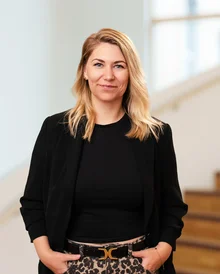New digital support service for relatives of people with dementia
With iDEM-Support, researchers at Witten/Herdecke University are bringing an international training programme to everyday nursing care in Germany for the first time.

Anyone caring for a person with dementia at home is often under constant strain - physically, emotionally and organisationally. A lot of information is overwhelming and often difficult to understand, and digital services seem confusing. This is where a new project involving the Chair of Didactics and Educational Research in Health Science and the Junior Professorship of Digital Health at Witten/Herdecke University (UW/H) comes in: iDEM-Support aims to offer carers and caregiving relatives - for example, neighbours and friends as well as family - exactly the support they really need.
iDEM-Support is based on the World Health Organization's (WHO) iSupport programme - a proven digital training programme for carers and caregiving relatives. It has already been successfully implemented worldwide. However, what works internationally does not automatically fit the complex circumstances in Germany. That is why the research team is now adapting the platform specifically to the conditions in Germany for the first time - linguistically and culturally. This means that information on dementia and the role of carers and caregivers as well as how to deal with changes in behaviour are taken into account. The aim is to provide relatives with knowledge suitable for everyday use and interactive opportunities for exchange. In order to best adapt the design to the needs of the users, the development is carried out together with experts and relatives.
Understanding and using digital
An additional module makes the programme adapted for Germany special: it helps people to find their way through the jungle of digital health information. Many relatives do not know which sources are trustworthy or how online information can be applied to their personal care situation. This is why iDEM-Support offers a module for building digital health literacy. This addresses, for example, how information can be specifically searched for, critically evaluated and used sensibly.
Before the programme becomes widely available, the research team will test it with around 140 carers and caregiving relatives as well as experts and provide scientific support. iDEM-Support will be accessible on PCs, tablets and smartphones.
A look ahead
"If carers and caregiving relatives are well informed and supported, this not only improves the quality of care at home - it can also avoid hospital stays and significantly reduce psychological stress," says Dr Julia Nitsche, research associate in the project team. The iDEM-Support project also shows how digitalisation can be implemented effectively in the health care system. Her colleague from the project team, Prof Dr Theresa Sophie Busse, adds: "We see real potential here to change the care culture in Germany in the long term."
Further information:
The project iDEM Support project is being funded for three years by the Innovation Fund of the Federal Joint Committee. The consortium leader of this project is the Chair of Health Care Research at the Institute for Diversity Medicine at Ruhr-Universität Bochum. Other consortium partners are the Department of Medical Biometry and Epidemiology and the Department of General Practice at Ruhr-Universität Bochum, the Chair of Didactics and Educational Research in Health Science and the Junior Professorship of Digital Health at Witten/Herdecke University, as well as Ergosign GmbH. The project also works closely with practice partners such as the German Alzheimer's Society, Wir pflegen - Interessenvertretung u. Selbsthilfe pflegender Angehöriger in Nordrhein-Westfalen e. V. and Letzte Hilfe Kurse GmbH. V. and Letzte Hilfe Kurse GmbH, which also support the continuation of the programme.
Photos for download
Contact person

Svenja Malessa
Press Officer
Administration | Communication & Marketing
Alfred-Herrhausen-Straße 48
58455 Witten
Room number: 2.F05
